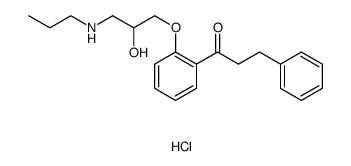Propafenone-(phenyl-d5) (hydrochloride)
Modify Date: 2024-01-06 16:46:02

Propafenone-(phenyl-d5) (hydrochloride) structure
|
Common Name | Propafenone-(phenyl-d5) (hydrochloride) | ||
|---|---|---|---|---|
| CAS Number | 93909-48-9 | Molecular Weight | 377.90500 | |
| Density | N/A | Boiling Point | N/A | |
| Molecular Formula | C21H28ClNO3 | Melting Point | N/A | |
| MSDS | N/A | Flash Point | N/A | |
Use of Propafenone-(phenyl-d5) (hydrochloride)Propafenone-(phenyl-dd5) (hydrochloride) is the deuterium labeled Propafenone hydrochloride[1]. Propafenone hydrochloride is a class of anti-arrhythmic medication, which treats illnesses associated with rapid heart beats such as atrial and ventricular arrhythmias[2]. |
| Name | 1-Propanone, 1-[2-[2-hydroxy-3-(propylamino)propoxy]phenyl]-3-(phenyl-d5)-, hydrochloride |
|---|---|
| Synonym | More Synonyms |
| Description | Propafenone-(phenyl-dd5) (hydrochloride) is the deuterium labeled Propafenone hydrochloride[1]. Propafenone hydrochloride is a class of anti-arrhythmic medication, which treats illnesses associated with rapid heart beats such as atrial and ventricular arrhythmias[2]. |
|---|---|
| Related Catalog | |
| In Vitro | Stable heavy isotopes of hydrogen, carbon, and other elements have been incorporated into drug molecules, largely as tracers for quantitation during the drug development process. Deuteration has gained attention because of its potential to affect the pharmacokinetic and metabolic profiles of drugs[1]. |
| References |
| Molecular Formula | C21H28ClNO3 |
|---|---|
| Molecular Weight | 377.90500 |
| Exact Mass | 377.17600 |
| PSA | 58.56000 |
| LogP | 4.43430 |
| PROPAFENONE D5 |
| Propafenone D5 Hydrochloride |